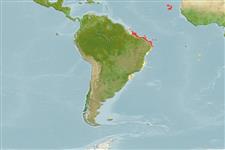Teleostei (teleosts) >
Eupercaria/misc (Various families in series Eupercaria) >
Labridae (Wrasses) > Bodianinae
Etymology: Bodianus: Bodianus after Bodiano or Pudiano, from the Portuguese pudor, meaning modesty (Jordan & Evermann, 1896); insularis: Name derived from a Latin adjective meaning 'of an island'; in reference to the apparent restriction of this species to islands associated with the Mid-Atlantic Ridge (Ref. 75973).
Environment: milieu / climate zone / depth range / distribution range
Ecology
Marine; reef-associated; depth range 6 - 60 m (Ref. 58047). Tropical
Eastern Atlantic: St. Paul Rocks, Ascension and St. Helena.
Size / Weight / Age
Maturity: Lm ? range ? - ? cm
Max length : 33.0 cm TL male/unsexed; (Ref. 3637)
Caught in areas of rock and rubble bottoms associated with sand or reef-like areas. Protogynous hermaphrodite, with obvious sexual dichromatism (Ref. 5292). Oviparous, distinct pairing during breeding (Ref. 205). Juveniles remove ectoparasites from other species (Ref. 86997).
Life cycle and mating behavior
Maturity | Reproduction | Spawning | Eggs | Fecundity | Larvae
Oviparous, distinct pairing during breeding (Ref. 205).
Gomon, M.F., 1981. Labridae. In W. Fischer, G. Bianchi and W.B. Scott (eds.) FAO species identification sheets for fishery purposes. Eastern Central Atlantic; fishing areas 34, 47 (in part). Department of Fisheries and Oceans Canada and FAO. Vol. 2. pag. var. (Ref. 3637)
IUCN Red List Status (Ref. 130435: Version 2024-2)
Threat to humans
Harmless
Human uses
Fisheries: minor commercial
Tools
Special reports
Download XML
Internet sources
Estimates based on models
Preferred temperature (Ref.
123201): 26.1 - 27.6, mean 27.4 °C (based on 42 cells).
Phylogenetic diversity index (Ref.
82804): PD
50 = 0.5000 [Uniqueness, from 0.5 = low to 2.0 = high].
Bayesian length-weight: a=0.01230 (0.00569 - 0.02662), b=3.05 (2.87 - 3.23), in cm total length, based on LWR estimates for this Genus-body shape (Ref.
93245).
Trophic level (Ref.
69278): 3.5 ±0.5 se; based on size and trophs of closest relatives
Resilience (Ref.
120179): Medium, minimum population doubling time 1.4 - 4.4 years (Preliminary K or Fecundity.).
Fishing Vulnerability (Ref.
59153): Low vulnerability (23 of 100).
